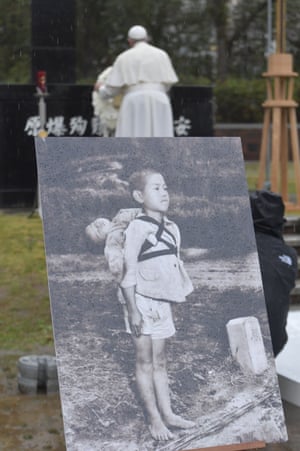Pope Francis calls for a ‘world without nuclear weapons’ during visit
Pontiff urges disarmament as he tours Japan’s atomic bomb sites and meets survivors of the 1945 attacks
ARTICLE BY: JUSTIN MCCURRAY | theguardian.com
Pope Francis has condemned the “unspeakable horror” of nuclear weapons during a visit to Nagasaki, one of two Japanese cities destroyed by American atomic bombs towards the end of the second world war.
Speaking on the second day of the first papal visit to Japan for 38 years, Francis urged world leaders to end the stockpiling of nuclear weapons, saying it offered their nations a false sense of security.
“Convinced as I am that a world without nuclear weapons is possible and necessary, I ask political leaders not to forget that these weapons cannot protect us from current threats to national and international security,” he told hundreds of people at the city’s rain-drenched atomic bomb hypocenter park on Sunday.
Earlier, Francis had placed a wreath and prayed at the foot of a memorial to the 74,000 people who died instantly and in the months after the US dropped a nuclear bomb on Nagasaki on 9 August 1945, three days after it had carried out a nuclear attack on Hiroshima, in which 140,000 people died by the end of the year.
“This place makes us deeply aware of the pain and horror that we human beings are capable of inflicting upon one another,” Francis said, standing next to a large photograph of a young boy carrying his dead baby brother on his back at a crematorium in the aftermath of the attack on Nagasaki.
Francis was given the photograph several years ago and has since distributed tens of thousands of copies. He was due to meet the widow and son of Joe O’Donnell, the American military photographer who took it.

The 82-year-old pontiff, who will visit Hiroshima later Sunday, has long been a vocal opponent of nuclear weapons. The Holy See was among the first countries to sign and ratify a 2017 nuclear prohibition treaty. But nuclear powers, and countries such as Japan that fall under the US nuclear umbrella, have refused to sign it.
“In a world where millions of children and families live in inhumane conditions, the money that is squandered and the fortunes made through the manufacture, upgrading, maintenance and sale of ever more destructive weapons, are an affront crying out to heaven,” Francis said.
He urged world leaders to recommit to arms control efforts and the eventual abolition of nuclear weapons. “We need to ponder the catastrophic impact of their deployment, especially from a humanitarian and environmental standpoint, and reject heightening a climate of fear, mistrust and hostility fomented by nuclear doctrines.”
A survivor of the Nagasaki bombing said he hoped the pope’s words would make nuclear powers think seriously about disarmament. Describing his experience 74 years ago as “a living hell,” Minoru Moriuchi, an 82-year-old Catholic, said: “My father’s sister ran away to our house with her two children and I never forgot the sight – their bodies were reddish-black and completely burnt.
“Four other relatives were brought in … but they didn’t look like humans,” he told Agence France-Presse.
In Hiroshima, Francis was due to meet ageing survivors of the atomic bombings – the hibakusha – at the city’s peace memorial park.
The symbolism of his visit to Nagasaki extends beyond its tragic place in wartime history.
Francis was scheduled to pay tribute at a site in the city devoted to martyrs among Japan’s earliest Christians, whose religion was banned by the country’s shogun rulers in the early 1600s. Suspected believers were forced to renounce their faith or be tortured to death. Many continued to worship in secret, as “hidden Christians” until the ban was lifted in the late 1800s.
Francis is the first pope to visit Japan – where there are fewer than half a million Catholics – since 1981, when John Paul II traveled to Nagasaki and Hiroshima to call for the abolition of nuclear weapons amid cold war tensions between the US and the Soviet Union.
On Monday, Francis will meet survivors of the March 2011 earthquake, tsunami and nuclear disaster, as well as Japan’s new emperor, Naruhito, and the prime minister, Shinzo Abe.
